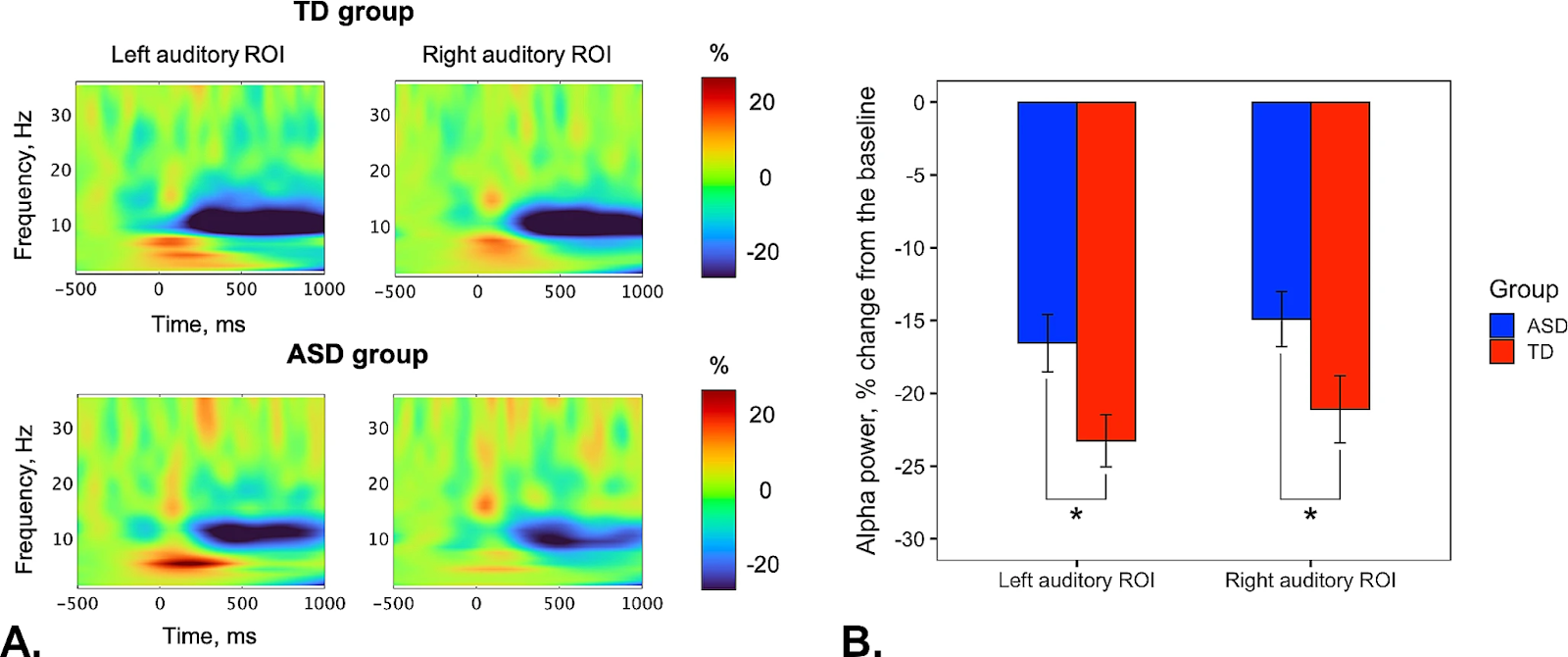Children with Autism Process Auditory Information Differently

A team of scientists, including researchers from the HSE Centre for Language and Brain, examined specific aspects of auditory perception in children with autism. The scientists observed atypical alpha rhythm activity both during sound perception and at rest. This suggests that these children experience abnormalities in the early stages of sound processing in the brain's auditory cortex. Over time, these abnormalities can result in language difficulties. The study findings have been published in Brain Structure and Function.
Autism spectrum disorders (ASD) are a group of conditions caused by abnormalities in brain development that can affect communication skills and social behaviour. Children with ASD often experience co-occurring language impairments, ranging from mild language deficits to a complete inability to speak.
The causes of language impairment in ASD are not yet well understood. Researchers believe that the neurobiological mechanisms of autism stem from an imbalance between excitatory and inhibitory processes in the cerebral cortex, driven by oscillations of nerve cells in the brain. These oscillations produce weak but detectable electromagnetic signals, such as alpha, beta, and gamma rhythms, which can be measured using magnetoencephalography (MEG).
An international team of researchers, including scientists from the HSE Centre for Language and Brain, studied alpha rhythm oscillations (markers of excitability) in children with autism. Alpha rhythms play a key role in processing sensory information and maintaining attention, eg during auditory perception.
The scientists explored the relationship between sound perception and language impairment in children with ASD. To achieve this, they used magnetoencephalography to measure brain activity in 20 children with autism of varying severity and in 20 typically developing controls. All study participants underwent clinical and behavioural language assessments, as well as tests for nonverbal intelligence (IQ) and the severity of autistic traits. Their language skills were measured using RuCLAB (Russian Child Language Assessment Battery). During the MEG, participants were presented with sound stimuli while their brain activity was measured, requiring no special actions from them. The authors of the experiment monitored alpha oscillations both at rest and during the processing of presented audio signals.
It was found that children with autism exhibit impaired alpha rhythms both during auditory perception and at rest. Typically, when sounds are processed in the auditory cortex, the power of alpha waves decreases significantly, while it increases during rest. The opposite pattern was observed in children with autism.

'A slight decrease in alpha rhythm power during auditory information processing in children with autism indicates increased excitability of neural networks in the auditory cortex, confirming an imbalance between excitation and inhibition in the cerebral cortex,' explains Vardan Arutiunian, co-author of the study and research fellow at the Seattle Children's Research Institute, USA.
The authors of the paper also found a link between brain activity at rest in the left auditory cortex and the language abilities of children with ASD. The researchers converted the complex, multidimensional MEG signals into a set of parameters, analysed them, and discovered that one component of the signal (offset), which reflects the average frequency of neural discharges, is associated with language skills. The higher this parameter (and consequently, the greater the resting neural excitability in the left auditory cortex), the poorer the language skills of children with ASD.

Olga Dragoy
'We analysed all the data collected during the experiment, including the MEG results, IQ tests, and assessments of autistic traits and language skills. It was found that children with more impaired neural processes in the left hemisphere exhibited poorer language abilities. We observed that in autism, abnormalities are present at the early stages of information processing in the auditory cortex, which can impact higher-level processes such as language,' according to Olga Dragoy, Director of the HSE Centre for Language and Brain.
The study's findings can lead to a better understanding of the causes of language impairment in autism spectrum disorders and contribute to the development of corrective interventions.
See also:
Scholars Disprove Existence of ‘Crisis of Trust’ in Science
An international team of researchers, including specialists from HSE University, has conducted a large-scale survey in 68 countries on the subject of trust in science. In most countries, people continue to highly value the work of scientists and want to see them take a more active role in public life. The results have been published in Nature Human Behaviour.
Education System Reforms Led to Better University Performance, HSE Researchers Find
A study by researchers at the HSE Faculty of Economic Sciences and the Institute of Education have found that the number of academic papers published by research universities in international journals has tripled in the past eight years. Additionally, universities have developed more distinct specialisations. Thus, sectoral universities specialising in medical, pedagogical, technical, and other fields are twice as likely to admit students to target places. The study has been published in Vocation, Technology & Education.
Scientists Record GRB 221009A, the Brightest Gamma-Ray Burst in Cosmic History
A team of scientists from 17 countries, including physicists from HSE University, analysed early photometric and spectroscopic data of GRB 221009A, the brightest gamma-ray burst ever recorded. The data was obtained at the Sayan Observatory one hour and 15 minutes after the emission was registered. The researchers detected photons with an energy of 18 teraelectronvolts (TeV). Theoretically, such high-energy particles should not reach Earth, but data analysis has confirmed that they can. The results challenge the theory of gamma radiation absorption and may point to unknown physical processes. The study has been published in Astronomy & Astrophysics.
Chemists Simplify Synthesis of Drugs Involving Amide Groups
Chemists from HSE University and the Nesmeyanov Institute of Organoelement Compounds of the Russian Academy of Sciences (INEOS RAS) have developed a new method for synthesising amides, essential compounds in drug production. Using a ruthenium catalyst and carbon monoxide under precisely controlled reaction conditions, they successfully obtained the target product without by-products or complex purification steps. The method has already been tested for synthesising a key component of Vorinostat, a drug used to treat T-cell lymphoma. This approach could lower the cost of the drug by orders of magnitude. The paper has been published in the Journal of Catalysis. The study was supported by the Russian Science Foundation.
Scientists Examine Neurobiology of Pragmatic Reasoning
An international team including scientists from HSE University has investigated the brain's ability to comprehend hidden meanings in spoken messages. Using fMRI, the researchers found that unambiguous meanings activate brain regions involved in decision-making, whereas processing complex and ambiguous utterances engages regions responsible for analysing context and the speaker's intentions. The more complex the task, the greater the interaction between these regions, enabling the brain to decipher the meaning. The study has been published in NeuroImage.
Scientists Present New Solution to Imbalanced Learning Problem
Specialists at the HSE Faculty of Computer Science and Sber AI Lab have developed a geometric oversampling technique known as Simplicial SMOTE. Tests on various datasets have shown that it significantly improves classification performance. This technique is particularly valuable in scenarios where rare cases are crucial, such as fraud detection or the diagnosis of rare diseases. The study's results are available on ArXiv.org, an open-access archive, and will be presented at the International Conference on Knowledge Discovery and Data Mining (KDD) in summer 2025 in Toronto, Canada.
Hi-Tech Grief: HSE Researchers Explore the Pros and Cons of Digital Commemoration
Researchers at HSE University in Nizhny Novgorod have explored how technological advancements are transforming the ways in which people preserve the memory of the deceased and significant events. Digital technologies enable the creation of virtual memorials, the preservation of personal stories and belongings of the deceased, interaction with their digital footprint, and even the development of interactive avatars based on their online activity. However, these technologies not only evoke nostalgia and provide a sense of relief but can also heighten anxiety and fear, and delay the process of accepting loss. The study has been published in Chelovek (The Human Being).
Scientists Find Out Why Aphasia Patients Lose the Ability to Talk about the Past and Future
An international team of researchers, including scientists from the HSE Centre for Language and Brain, has identified the causes of impairments in expressing grammatical tense in people with aphasia. They discovered that individuals with speech disorders struggle with both forming the concept of time and selecting the correct verb tense. However, which of these processes proves more challenging depends on the speaker's language. The findings have been published in the journal Aphasiology.
Implementation of Principles of Sustainable Development Attracts More Investments
Economists from HSE and RUDN University have analysed issues related to corporate digital transformation processes. The introduction of digital solutions into corporate operations reduces the number of patents in the field of green technologies by 4% and creates additional financial difficulties. However, if a company focuses on sustainable development and increases its rating in environmental, social, and governance performance (ESG), the negative effects decrease. Moreover, when the ESG rating is high, digitalisation can even increase the number of patents by 2%. The article was published in Sustainability.
Russian Scientists Develop New Compound for Treating Aggressive Tumours
A team of Russian researchers has synthesised a novel compound for boron neutron capture therapy (BNCT), a treatment for advanced cancer that uses the boron-10 isotope. The compound exhibits low toxicity, excellent water solubility, and eliminates the need for administering large volumes. Most importantly, the active substance reaches the tumour with minimal impact on healthy tissues. The study was published in the International Journal of Molecular Sciences shortly before World Cancer Day, observed annually on February 4.


